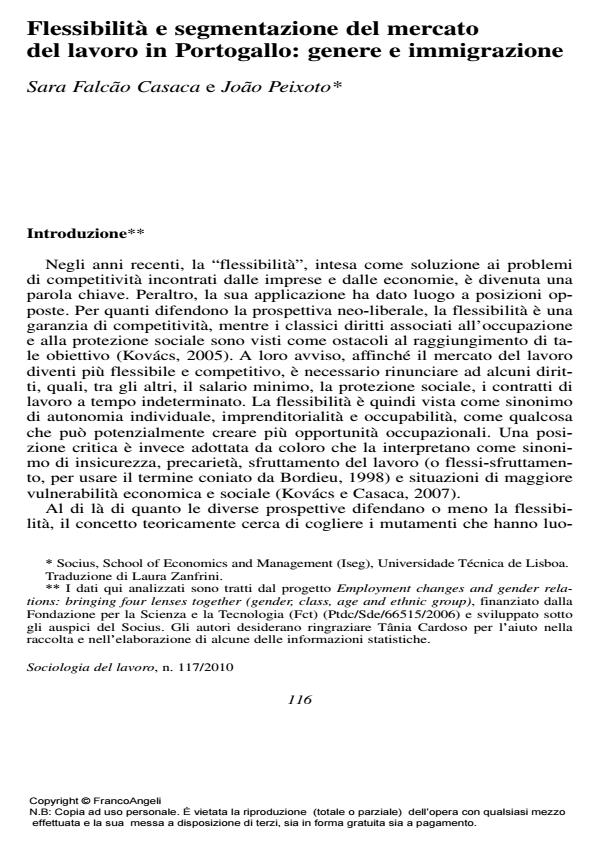Flessibilità e segmentazione del mercato del lavoro in Portogallo: genere e immigrazione
Journal title SOCIOLOGIA DEL LAVORO
Author/s Sara Falcao Casaca, Joao Peixoto
Publishing Year 2010 Issue 2010/117 Language Italian
Pages 18 P. 116-133 File size 447 KB
DOI 10.3280/SL2010-117009
DOI is like a bar code for intellectual property: to have more infomation
click here
Below, you can see the article first page
If you want to buy this article in PDF format, you can do it, following the instructions to buy download credits

FrancoAngeli is member of Publishers International Linking Association, Inc (PILA), a not-for-profit association which run the CrossRef service enabling links to and from online scholarly content.
Flexibility and labour market segmentation in Portugal: the role of gender and immigration - This text provides a general overview of the labour market in Portugal, with gender and migration patterns being adopted as the perspectives for its analysis. In a scenario in which there is an ever greater flexibility of employment, the increased participation of women in the world of work and the growth in immigration have both played a decisive role. Both women and immigrants have been over-represented in the more precarious segments of employment, which means that they have helped to sustain some of the more recent employment dynamics. Some of the main indicators of the situation of women in the labour market are described (participation levels, sectors of activity, contractual arrangements, part-time work and unemployment) together with a study of data relating to foreign immigration (participation rates, sectors of activity, discrimination, contractual arrangements and unemployment). It is concluded that the modes of incorporation of women and immigrants in the labour market explain why they continue to face powerful structural obstacles to equality and integration.
Keywords: Labour market, segmentation, flexibility, gender, immigration, Portugal
- Les travailleurs domestiques en Europe: que disent les chiffres? Manuel ABRANTES, in Revue internationale du Travail /2014 pp.245
DOI: 10.1111/j.1564-9121.2014.00207.x - Service interaction and dignity in cleaning work: how important is the organizational context? Sofia Alexandra Cruz, Manuel Abrantes, in Employee Relations /2014 pp.294
DOI: 10.1108/ER-06-2013-0064 - Domiciliary care and migrant domestic workers: grasping the new institutional landscape Manuel Abrantes, in International Journal of Sociology and Social Policy /2014 pp.593
DOI: 10.1108/IJSSP-04-2013-0050 - ‘I Know It Sounds Nasty and Stereotyped’: Searching for the Competent Domestic Worker Manuel Abrantes, in Gender, Work & Organization /2014 pp.427
DOI: 10.1111/gwao.12046 - Uncertain and Experimental Circularity: An Investigation of the Trajectories of Migrant Domestic Workers in Lisbon Manuel Abrantes, in Journal of Immigrant & Refugee Studies /2013 pp.384
DOI: 10.1080/15562948.2013.824132 - Trabajadores domésticos en Europa. Hablemos de cifras Manuel ABRANTES, in Revista Internacional del Trabajo /2014 pp.249
DOI: 10.1111/j.1564-9148.2014.00206.x - What about the numbers? A quantitative contribution to the study of domestic services in Europe Manuel ABRANTES, in International Labour Review /2014 pp.223
DOI: 10.1111/j.1564-913X.2014.00202.x
Sara Falcao Casaca, Joao Peixoto, Flessibilità e segmentazione del mercato del lavoro in Portogallo: genere e immigrazione in "SOCIOLOGIA DEL LAVORO " 117/2010, pp 116-133, DOI: 10.3280/SL2010-117009